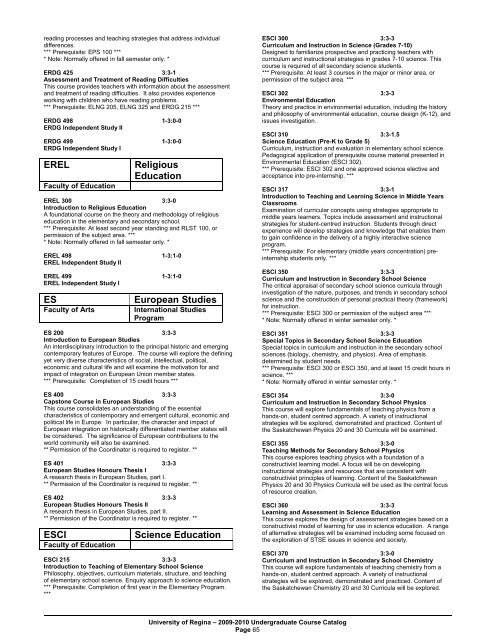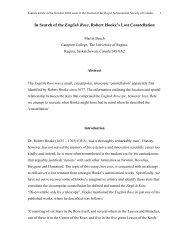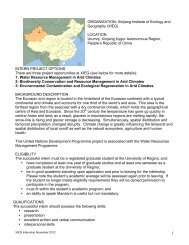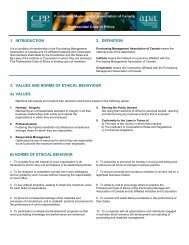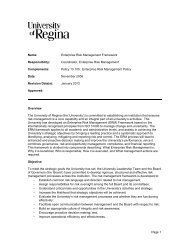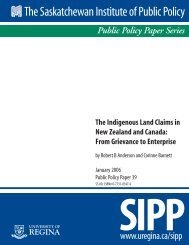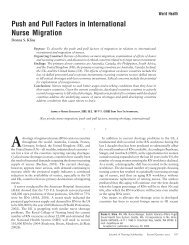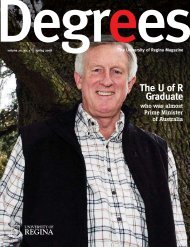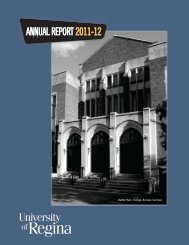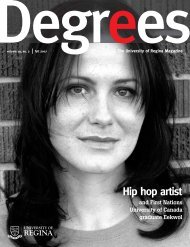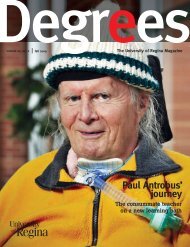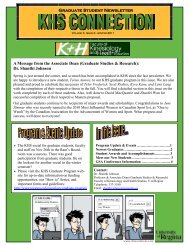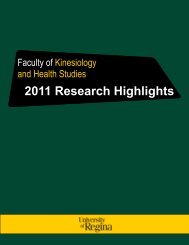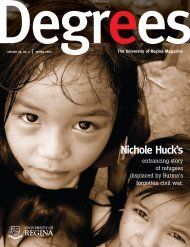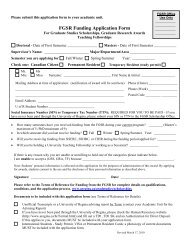2009-2010 Undergraduate Course Catalog - University of Regina
2009-2010 Undergraduate Course Catalog - University of Regina
2009-2010 Undergraduate Course Catalog - University of Regina
Create successful ePaper yourself
Turn your PDF publications into a flip-book with our unique Google optimized e-Paper software.
eading processes and teaching strategies that address individual<br />
differences.<br />
*** Prerequisite: EPS 100 ***<br />
* Note: Normally <strong>of</strong>fered in fall semester only. *<br />
ERDG 425 3:3-1<br />
Assessment and Treatment <strong>of</strong> Reading Difficulties<br />
This course provides teachers with information about the assessment<br />
and treatment <strong>of</strong> reading difficulties. It also provides experience<br />
working with children who have reading problems.<br />
*** Prerequisite: ELNG 205, ELNG 325 and ERDG 215 ***<br />
ERDG 498 1-3:0-0<br />
ERDG Independent Study II<br />
ERDG 499 1-3:0-0<br />
ERDG Independent Study I<br />
EREL<br />
Faculty <strong>of</strong> Education<br />
Religious<br />
Education<br />
EREL 300 3:3-0<br />
Introduction to Religious Education<br />
A foundational course on the theory and methodology <strong>of</strong> religious<br />
education in the elementary and secondary school.<br />
*** Prerequisite: At least second year standing and RLST 100, or<br />
permission <strong>of</strong> the subject area. ***<br />
* Note: Normally <strong>of</strong>fered in fall semester only. *<br />
EREL 498 1-3:1-0<br />
EREL Independent Study II<br />
EREL 499 1-3:1-0<br />
EREL Independent Study I<br />
ES<br />
Faculty <strong>of</strong> Arts<br />
European Studies<br />
International Studies<br />
Program<br />
ES 200 3:3-3<br />
Introduction to European Studies<br />
An interdisciplinary introduction to the principal historic and emerging<br />
contemporary features <strong>of</strong> Europe. The course will explore the defining<br />
yet very diverse characteristics <strong>of</strong> social, intellectual, political,<br />
economic and cultural life and will examine the motivation for and<br />
impact <strong>of</strong> integration on European Union member states.<br />
*** Prerequisite: Completion <strong>of</strong> 15 credit hours ***<br />
ES 400 3:3-3<br />
Capstone <strong>Course</strong> in European Studies<br />
This course consolidates an understanding <strong>of</strong> the essential<br />
characteristics <strong>of</strong> contemporary and emergent cultural, economic and<br />
political life in Europe. In particular, the character and impact <strong>of</strong><br />
European integration on historically differentiated member states will<br />
be considered. The significance <strong>of</strong> European contributions to the<br />
world community will also be examined.<br />
** Permission <strong>of</strong> the Coordinator is required to register. **<br />
ES 401 3:3-3<br />
European Studies Honours Thesis I<br />
A research thesis in European Studies, part I.<br />
** Permission <strong>of</strong> the Coordinator is required to register. **<br />
ES 402 3:3-3<br />
European Studies Honours Thesis II<br />
A research thesis in European Studies, part II.<br />
** Permission <strong>of</strong> the Coordinator is required to register. **<br />
ESCI<br />
Faculty <strong>of</strong> Education<br />
Science Education<br />
ESCI 215 3:3-3<br />
Introduction to Teaching <strong>of</strong> Elementary School Science<br />
Philosophy, objectives, curriculum materials, structure, and teaching<br />
<strong>of</strong> elementary school science. Enquiry approach to science education.<br />
*** Prerequisite: Completion <strong>of</strong> first year in the Elementary Program.<br />
***<br />
ESCI 300 3:3-3<br />
Curriculum and Instruction in Science (Grades 7-10)<br />
Designed to familiarize prospective and practicing teachers with<br />
curriculum and instructional strategies in grades 7-10 science. This<br />
course is required <strong>of</strong> all secondary science students.<br />
*** Prerequisite: At least 3 courses in the major or minor area, or<br />
permission <strong>of</strong> the subject area. ***<br />
ESCI 302 3:3-3<br />
Environmental Education<br />
Theory and practice in environmental education, including the history<br />
and philosophy <strong>of</strong> environmental education, course design (K-12), and<br />
issues investigation.<br />
ESCI 310 3:3-1.5<br />
Science Education (Pre-K to Grade 5)<br />
Curriculum, instruction and evaluation in elementary school science.<br />
Pedagogical application <strong>of</strong> prerequisite course material presented in<br />
Environmental Education (ESCI 302).<br />
*** Prerequisite: ESCI 302 and one approved science elective and<br />
acceptance into pre-internship. ***<br />
ESCI 317 3:3-1<br />
Introduction to Teaching and Learning Science in Middle Years<br />
Classrooms<br />
Examination <strong>of</strong> curricular concepts using strategies appropriate to<br />
middle years learners. Topics include assessment and instructional<br />
strategies for student-centred instruction. Students through direct<br />
experience will develop strategies and knowledge that enables them<br />
to gain confidence in the delivery <strong>of</strong> a highly interactive science<br />
program.<br />
*** Prerequisite: For elementary (middle years concentration) preinternship<br />
students only. ***<br />
ESCI 350 3:3-3<br />
Curriculum and Instruction in Secondary School Science<br />
The critical appraisal <strong>of</strong> secondary school science curricula through<br />
investigation <strong>of</strong> the nature, purposes, and trends in secondary school<br />
science and the construction <strong>of</strong> personal practical theory (framework)<br />
for instruction.<br />
*** Prerequisite: ESCI 300 or permission <strong>of</strong> the subject area ***<br />
* Note: Normally <strong>of</strong>fered in winter semester only. *<br />
ESCI 351 3:3-3<br />
Special Topics in Secondary School Science Education<br />
Special topics in curriculum and instruction in the secondary school<br />
sciences (biology, chemistry, and physics). Area <strong>of</strong> emphasis<br />
determined by student needs.<br />
*** Prerequisite: ESCI 300 or ESCI 350, and at least 15 credit hours in<br />
science. ***<br />
* Note: Normally <strong>of</strong>fered in winter semester only. *<br />
ESCI 354 3:3-0<br />
Curriculum and Instruction in Secondary School Physics<br />
This course will explore fundamentals <strong>of</strong> teaching physics from a<br />
hands-on, student centred approach. A variety <strong>of</strong> instructional<br />
strategies will be explored, demonstrated and practiced. Content <strong>of</strong><br />
the Saskatchewan Physics 20 and 30 Curricula will be examined.<br />
ESCI 355 3:3-0<br />
Teaching Methods for Secondary School Physics<br />
This course explores teaching physics with a foundation <strong>of</strong> a<br />
constructivist learning model. A focus will be on developing<br />
instructional strategies and resources that are consistent with<br />
constructivist principles <strong>of</strong> learning. Content <strong>of</strong> the Saskatchewan<br />
Physics 20 and 30 Physics Curricula will be used as the central focus<br />
<strong>of</strong> resource creation.<br />
ESCI 360 3:3-3<br />
Learning and Assessment in Science Education<br />
This course explores the design <strong>of</strong> assessment strategies based on a<br />
constructivist model <strong>of</strong> learning for use in science education. A range<br />
<strong>of</strong> alternative strategies will be examined including some focused on<br />
the exploration <strong>of</strong> STSE issues in science and society.<br />
ESCI 370 3:3-0<br />
Curriculum and Instruction in Secondary School Chemistry<br />
This course will explore fundamentals <strong>of</strong> teaching chemistry from a<br />
hands-on, student centred approach. A variety <strong>of</strong> instructional<br />
strategies will be explored, demonstrated and practiced. Content <strong>of</strong><br />
the Saskatchewan Chemistry 20 and 30 Curricula will be explored.<br />
<strong>University</strong> <strong>of</strong> <strong>Regina</strong> – <strong>2009</strong>-<strong>2010</strong> <strong>Undergraduate</strong> <strong>Course</strong> <strong>Catalog</strong><br />
Page 65


